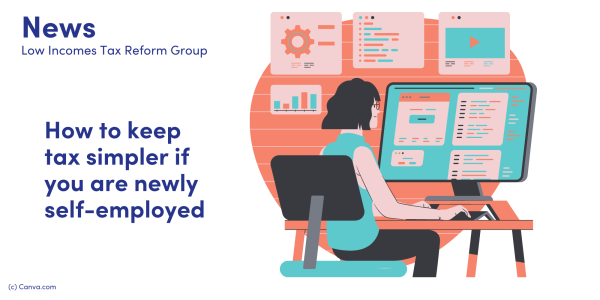How to keep tax simpler if you are newly self-employed
Starting a new business can be both an exciting and daunting time. There are many things to think about, including what you need to do to prepare your business accounts and tax return.
This article briefly explains what you can do now to help simplify your future tax, in view of two major changes to the tax system which are on the horizon.
| This news story was published in June 2022. Please note that on 19 December 2022 the government announced changes to the start dates for Making Tax Digital for Income Tax. For more information on these changes see our website guidance. |

Many self-employed individuals and partnerships choose to prepare their own accounts and Self Assessment tax returns. As part of this, you need to decide on an accounting period to use to prepare your accounts. This is usually a 12-month period but may be shorter or longer than a year when you first begin trading.
A new system for dealing with income tax is being introduced in April 2024 which will apply to most self-employed individuals (and partners). This is known as Making Tax Digital for Income Tax (MTD) and will be the biggest change to the UK tax system in many years. We explain below how choices you make now about your accounting period can help make your tax affairs simpler once MTD applies to you.
Making Tax Digital (MTD)
MTD for the self-employed and landlords starts from April 2024 and for partnerships from April 2025. It will change how individuals with annual sales and/or rental income over £10,000 report their tax but there will be some exemptions. Many new businesses will fall under MTD as the £10,000 eligibility threshold is based on sales income rather than profit.
Under MTD, you will need to keep digital records showing your business income and expenses. You will also need to send digital quarterly returns (known as quarterly updates) and an End of Period statement to HMRC. The quarterly updates will include information relating to your business income and expenditure for the three months.
Although HMRC are still making some key decisions on MTD we know that quarterly updates will be required for the following periods:
- 6 April - 5 July
-
6 July - 5 October
-
6 October - 5 January
-
6 January - 5 April
However, you can make an election to change the quarterly update periods to end on a calendar month:
-
1 April - 30 June
-
1 July - 30 September
-
1 October - 31 December
-
1 January – 31 March
Having an accounting period which ends on either 31 March or 5 April should make your quarterly reporting and completion of your End of Period statement easier once MTD begins. If you are just setting up your business, you can choose one of these accounting dates from the start.
Basis period changes
Another change to rules, known as the ‘basis period reform’, is being introduced from April 2024.
Under the current rules, self-employed individuals and partnerships broadly report their profits for an accounting period. From April 2024 all self-employed individuals and partnerships will need to report their profits made during a tax year to HMRC. A tax year runs from 6 April to the 5 April in the following year, so the 2022/23 tax year is from 6 April 2022 to 5 April 2023. HMRC will allow any accounting year-end date between 31 March and 5 April to be treated as a tax year for this purpose.
After basis period reform you can still choose to use any accounting period. However, choosing a non-31 March/ 5 April accounting year end will make completing your tax returns more complicated. This is because you need to report your profits made during the tax year to HMRC and this will be different to your accounting profits.
To help with basis period reform there will also be a transition year in the 2023/24 tax year. This will result in some very complicated rules and interactions applying to that year and the following four tax years. These transition rules will only affect businesses who do not have an accounting period which matches the tax year.
Conclusion and more information
We have explained above that by choosing a 31 March or 5 April year end for your first accounting period-end date (and also for all subsequent accounting periods) you will likely find it easier to deal with the requirements of the new MTD regime. Remember your accounting period date does not have to be 12 months from when you start trading.
You may decide to use a different accounting period end date- perhaps for commercial reasons. If so, you may want to check our self-employment section before the start of the 2023/24 tax year as we will be writing detailed guidance on basis period reform.
HMRC are still finalising the MTD rules and we will update our information on MTD in due course.
You may also find our guide on self-employment useful.
